New professors share journeys and reflections
28 June 2016 | Story by NewsroomHow long does it take to become a professor? Following UCT's recent ad hominem promotions and as the university works to transform its academic cohort, this question is a moot point. Ten candidates share their journeys …
The often cited statement that it takes 20 years to grow a professor has come under scrutiny at a time when the university is working hard to transform its senior academic cohort.
There's no cookie-cutter method, says Ulrike Rivett, the Department of Information Systems' newest and first woman full professor and one of the 25 new professors named after UCT's latest round of ad hominem promotions. It depends on when you do your PhD and when you start on the first of four rungs to the top: lecturer level.
Rivett did invest 20 years in the process, including the five years she worked on her doctorate. Her journey was shaped by personal circumstances and choices – and some tough decisions.
Along the way, she had two children and 'migrated' from Engineering and the Built Environment to Commerce two years ago. She was able to do so thanks to the multidisciplinary nature of her work, first in GIS and geomatics and now in information systems, where she designs communications systems to bridge the gaps between government service delivery and the public.
She is one of ten new professors who shared their perspectives (including some do's and don'ts and why the process can be life-changing) in the vignettes that follow.
“20 years, including my PhD”
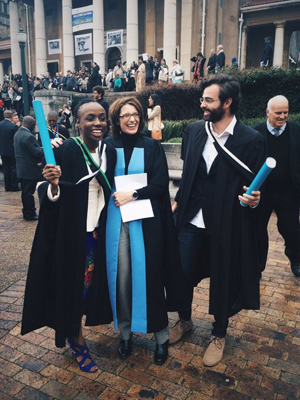 Prof Ulrike Rivett (middle) celebrates the graduation of two of her information systems master's students Lulama Ngobeni (left) and Carl Jacobs on 14 June 2016.
Prof Ulrike Rivett (middle) celebrates the graduation of two of her information systems master's students Lulama Ngobeni (left) and Carl Jacobs on 14 June 2016.“It's also about choices. I chose to have two children and take maternity leave and have research meetings at my house. I didn't write papers when I had babies. That can put five years on a woman's career.”
“I was on the Academics' Union; I had good people around me; and I was able to get a lot of advice and wisdom from senior colleagues and A-rated researchers who opened my eyes. They looked at my CV and pointed out the gaps. Some told me things I didn't like and there were some hard conversations. At the time I was working on the use of mobile phones in the HIV context, doing good outreach work [Cell-Life], but it wasn't giving me research publications. I had to understand that UCT's currency is research.”
“One of the A-rated colleagues told me that the most important thing to grow an academic career are postgraduate students: you have to value them and support them more than anything else. You have to humbly acknowledge that they help build your career.”
“I rang doorbells, from Vodacom to the Elton John Foundation, to get funding to attract really good research students. I wrote more proposals for funding than papers at the beginning of my career. Brilliant students made it easy for me to publish.”
“In the context of my research and the attempt to provide full funding to postgraduate students, you build your career by asking: What are the biggest problems? Then you ask: Who wants to pay for the problem to be solved?”
“A sense of humour helped – and walks on the beach when I got bad paper reviews, until an A-rated researcher took me aside and showed me some of his early bad reviews. All that NRF [National Research foundation] stuff and ratings … you have to go there.”
“There's no manual, no cookie-cutter method. We're not 'nice' people; most of us are not team players and therefore you have to find your own way – which can be a lonely but rewarding journey.”
“15 years after starting as a lecturer in 2001”
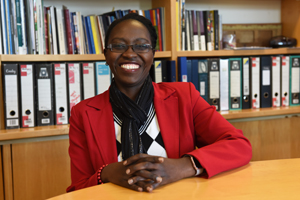 Professor Caroline Ncube.
Professor Caroline Ncube.“A reduced teaching load would have given me more space to research and write and complete my doctorate faster. As I'm not a South African citizen, I didn't qualify for any PhD-completion funding that would have enabled me to buy out some of my teaching and thus free up time.”
“When my sons were younger, it was difficult to attend capacity-building or other UCT events scheduled after hours. It was extremely helpful that I was able to enrol my younger son at UCT's Educare Centre, so he was in easy reach during the day. ... As my sons have grown older, it's become easier to participate in academic life. … I suggest that UCT schedules its research-related events with the circumstances of parents or primary caregivers in mind.”
“Set ambitious targets for yourself. And put in the work, even when times are bleak. When I joined UCT in 2005, I set the triple goals of obtaining a PhD, achieving full professorship and an NRF rating by the time I turned 40. I was 29 at the time … I made it with six months to spare.”
“Use as many of UCT's excellent resources as possible. The Emerging Researcher Programme [ERP] hosts invaluable workshops and seminars …. I was also mentored by the Research Office's Dr Lyn Holness under the auspices of the ERP. Since I became head of department in 2014, I've worked with Dr Margaret Orr, an executive coach in the office of the vice-chancellor. Dr Rob Morrell's assistance with my NRF rating was invaluable.”
“I also benefited enormously from attending the inaugural Association of Transnational Law Schools (Atlas) Agora at York University in 2008, partially funded by the ERP. I broke the back of my PhD during that eight-week residential stint for doctoral candidates.”
“the 20-year clock started ticking well before PhD”
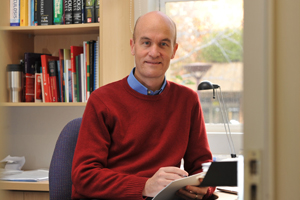 Professor Graeme Meintjes.
Professor Graeme Meintjes.“My advice for aspiring professors who are in their early careers is to identify a research area that allows you to carve a niche for yourself because it is novel or under-researched, and where the findings will potentially have a real impact in advancing your scientific field.”
“Align yourself with mentors and supervisors who can offer realistic guidance and strategic advice as you progress.”
“20 years, with a continental migration in between”
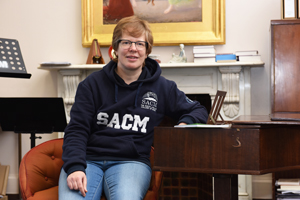 Professor Rebekka Sandmeier.
Professor Rebekka Sandmeier.“I could have done it in less time if I hadn't migrated between the English and German university systems. When I moved to Cape Town, it again took time to settle and build a scholarly network.”
“I believe that having lived, studied and worked in different countries has added to my skills as a university lecturer. It gives me different perspectives and experiences in terms of teaching, administration and research. I encourage my postgraduate students to go abroad for some time, or at least to a different university. A certain amount of turnover of academic staff at a university promotes new ideas and approaches.”
“Mentoring from a senior, more experienced colleague and reducing the teaching load in the first years might help [new academics].”
“Think very well before entering the university system. It is brilliant in that it gives you a lot of freedom. You can choose your topic to research and, to a certain extent, the courses you teach and the structuring of your time. And you're in an intellectually challenging environment. But on the other hand you need to be an expert in self-motivation and time-management. And the bureaucracy of a university can be highly frustrating.”
“In Germany the system of temporary contracts for non-professorial staff and the late access to a permanent professorial position at university (usually at 40 or older) has a huge impact on family planning. I consciously decided against having a family when I was in my late 20s. The tenure track / ad hominem promotion system in South Africa is much better in this respect. However, starting a family while in a junior position at a university will impact on the time it takes to complete the journey to full professorship.”
“14 years an academic and ten years from PhD to full professor”
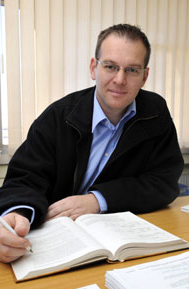 Professor Anton Schlechter.
Professor Anton Schlechter.“In 2002 I was fortunate enough to be appointed on a permanent basis as a lecturer, which allowed me to work side-by-side with the very academics that had instilled in me a love for research and teaching − and who had inspired me to pursue this career choice.”
“I think I fell in love with research when I did my master's, but it was definitely while doing my PhD that the relationship quickly flourished. I certainly learnt a lot about research and research design from my PhD promoter, a retired senior scholar at the time and a 'super researcher'. The research mentoring and coaching, being given a chance to stretch myself and to keep up collaborating with top international scholars were invaluable.”
“After getting my PhD, I started at UCT in 2006 as a senior lecturer. I was not only privileged once again to work among a group of esteemed academics and colleagues, but I was also fortunate to be coached in leadership and academic management.”
“For me the journey from PhD to senior lecturer to full professor was about ten years. Even though many say that being an academic is mostly an individual game, for me it was very much about working with and learning from my profs, other senior academics (both at UCT and at other universities), the wonderful staff in the Research Office, and all my colleagues.”
“I'm deeply grateful for the high levels of collegiality within our department and our faculty. It's the support, encouragement and advice from senior staff and many of my colleagues that has allowed this to happen. And, of course, the awesome students I've been privileged to be able to work with! Being an academic really makes me happy.”
“13 years from PhD”
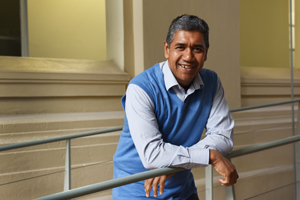 Professor Muazzam Jacobs.
Professor Muazzam Jacobs.“It would have been easier knowing and understanding early how the system works.”
“To those from historically disadvantaged groups, be stubborn in your belief that you can achieve and function at the highest level. Never compromise.”
“To quote Mandela: 'It always seems impossible until it's done.' ”
“Ten years after completing my physician specialist training”
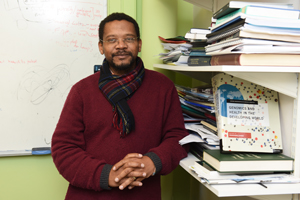 Professor Ambroise Wonkam.
Professor Ambroise Wonkam.“I don't believe it could have been done in less time. An average of ten years should be the regular time for normally active academics to achieve full professorship in a normal and enabling environment.”
“Academic life is highly demanding and it's unlikely to be a straight route. It requires a reasonable balance of research, teaching, administrative and social responsiveness activities. A fair amount of time is also devoted to grant writing and international travel, specifically in biomedical research, which is always very demanding on resources. Moreover, we all have families and social life to add to this.”
“A one-size solution for all isn't possible. Among the four main areas of expertise in academia, each individual should determine their areas of strength and weakness and look for appropriate enabling or corrective action.”
“The UCT Research Office, through the Emerging Researcher Programme, was a great facilitator, providing some seed funding to establish ourselves before seeking international grants. Research support is core. It also directly influences teaching and the supervision of postgraduate students.”
“To be productive as a researcher at the beginning of your career, choose to publish in areas that don't need massive funding but ideas and time, such as systematic reviews. The choice of the research niche is critical. I'd advise one to go for the frequent, specific and the most severe issues related to the place you live (it could be a disease or social disorder). Young researchers shouldn't be shy to explore the less popular, ambitious and innovative hypotheses.”
“Above all, be humble and persistent.”
“13 years post PhD”
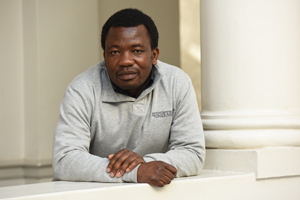 Professor Collet Dandara.
Professor Collet Dandara.“The route is not linear. But all the requirements outlined for ad hominem promotions should assist one to map a path to full professor. However, one has to find a research niche that is relevant and that will lead to publications.”
“One of the issues is support in certain activities. My strong area was research, where I was well supported by the Emerging Researcher Programme at UCT and later by the SAMRC [South African Medical Research Council] and NRF. Without research support, you cannot progress. This means you can't recruit students, you can't write manuscripts and obviously can't attend conferences – all major contributors to promotion.”
“However, even as much as the research is supported, there are certain areas, for example, sitting on committees or leading the department or division, which are out of a candidate's own control. Rotational positions give opportunities to a wide range of people to participate in various administrative activities. Rotational positions give different people opportunities to lead and introduce their philosophies and such change revitalises organisations.”
“To young and emerging staff, I would say: 'Work hard on the three aspects under your direct control: research, teaching and social responsiveness ... Once your research is very strong, your visibility will be difficult to ignore, and will lead to nominations for committees, and so on.' ”
“Surprisingly, I'm working even harder than before. I feel it's my students who're also enjoying the full professorship, especially my role modelling.”
“I've been married for 20 years. My wife took most of the pressure looking after our children. I think if you want family, you need a strong and supportive partner.”
“17-and-a-half years after my PhD”
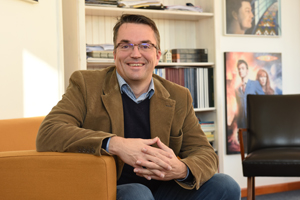 Professor Patrick Woudt.
Professor Patrick Woudt.“The ad hominem process is a tough and rigorous process but an inherently fair process benchmarked against firm standards of excellence in a broad range of relevant academic values: research, teaching, social responsibility and academic leadership roles.”
“What helped me tremendously in my academic growth over these years is the mentorship by a top international scholar, Emeritus Professor Brian Warner, and the high levels of collegiality within the department. Such an environment is extremely conducive to personal and academic growth.”
“Advice for young academics? I'd highlight two points: the value of senior mentorship during the early years post-PhD, and the tremendous value of a long postdoctoral fellowship (five years) in which a young researcher can establish a research niche for themselves. In this regard, it's a great pity that the NRF's Research Career Advancement fellowships were discontinued after a single round of fellowships.”
“15 years after my PhD”
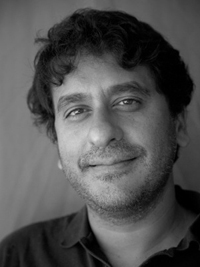 Professor Imraan Coovadia.
Professor Imraan Coovadia.“Is the route as linear as some would believe? No. Straight lines are fantasies.”
“What would have made it easier? I could have chosen something I was good at.”
“Think twice about becoming an academic, and then a third time. The same talent, imagination and perseverance that you need to be a good academic may well be better applied to professions which are more open by nature. Especially in a slow-growth, conservative, hierarchical society like South Africa, the academy – its bureaucracy and politics – can take away from a person exactly what brought them to it in the first place. If you do want to be a professor, try to be true to the discipline rather than the personalities.”
Story Helen Swingler. Photos Michael Hammond.
 This work is licensed under a Creative Commons Attribution-NoDerivatives 4.0 International License.
This work is licensed under a Creative Commons Attribution-NoDerivatives 4.0 International License.
Please view the republishing articles page for more information.










